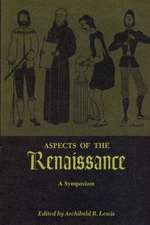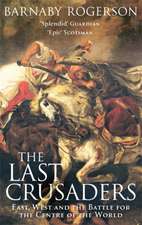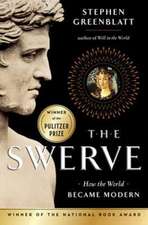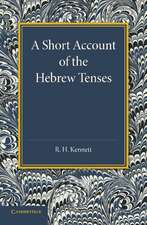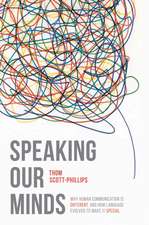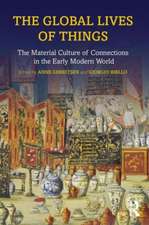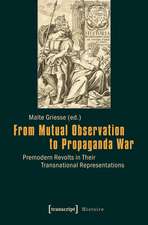History of Linguistics Vol III: Renaissance and Early Modern Linguistics: Longman Linguistics Library
Autor Giulio C. Lepschyen Limba Engleză Hardback – 23 dec 2016
The third volume of the History of Linguistics covers the Renaissance and the Early Modern Period. The chapter on the Renaissance (15th and 16th centuries), examines the study of Latin in both the new Humanist and rationalist traditions, along with the foundations of vernacular grammar in the study of Romance, Germanic and Slavic. The chapter on the Early Modern Period (17th and 18th centuries) presents the study of language in its philosophical context (Bacon, Port-Royal, Hobbes, Locke, Leibniz, the Enlightenment), as well as the accumulation of data which led to the foundation of Comparative Philology in the 19th century.
| Toate formatele și edițiile | Preț | Express |
|---|---|---|
| Paperback (1) | 489.26 lei 6-8 săpt. | |
| Taylor & Francis – 11 noi 1997 | 489.26 lei 6-8 săpt. | |
| Hardback (1) | 768.46 lei 6-8 săpt. | |
| Taylor & Francis – 23 dec 2016 | 768.46 lei 6-8 săpt. |
Din seria Longman Linguistics Library
- 15%
 Preț: 489.26 lei
Preț: 489.26 lei - 15%
 Preț: 690.03 lei
Preț: 690.03 lei - 15%
 Preț: 542.72 lei
Preț: 542.72 lei - 18%
 Preț: 1000.27 lei
Preț: 1000.27 lei - 15%
 Preț: 671.64 lei
Preț: 671.64 lei -
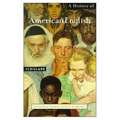 Preț: 489.26 lei
Preț: 489.26 lei - 15%
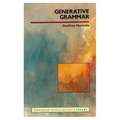 Preț: 566.52 lei
Preț: 566.52 lei -
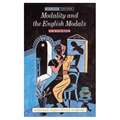 Preț: 488.29 lei
Preț: 488.29 lei - 15%
 Preț: 569.94 lei
Preț: 569.94 lei - 11%
 Preț: 327.08 lei
Preț: 327.08 lei - 18%
 Preț: 892.92 lei
Preț: 892.92 lei -
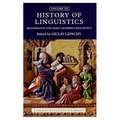 Preț: 489.26 lei
Preț: 489.26 lei - 15%
 Preț: 423.93 lei
Preț: 423.93 lei -
 Preț: 485.40 lei
Preț: 485.40 lei - 18%
 Preț: 1000.27 lei
Preț: 1000.27 lei - 18%
 Preț: 1003.12 lei
Preț: 1003.12 lei - 15%
 Preț: 669.94 lei
Preț: 669.94 lei - 15%
 Preț: 472.83 lei
Preț: 472.83 lei - 18%
 Preț: 1010.70 lei
Preț: 1010.70 lei -
 Preț: 477.99 lei
Preț: 477.99 lei -
 Preț: 487.19 lei
Preț: 487.19 lei - 18%
 Preț: 1218.08 lei
Preț: 1218.08 lei - 26%
 Preț: 1014.74 lei
Preț: 1014.74 lei - 15%
 Preț: 460.90 lei
Preț: 460.90 lei - 15%
 Preț: 562.41 lei
Preț: 562.41 lei - 15%
 Preț: 465.12 lei
Preț: 465.12 lei -
 Preț: 476.30 lei
Preț: 476.30 lei -
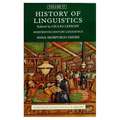 Preț: 492.59 lei
Preț: 492.59 lei -
 Preț: 489.26 lei
Preț: 489.26 lei - 8%
 Preț: 383.06 lei
Preț: 383.06 lei
Preț: 768.46 lei
Preț vechi: 1157.08 lei
-34% Nou
Puncte Express: 1153
Preț estimativ în valută:
147.04€ • 153.52$ • 121.70£
147.04€ • 153.52$ • 121.70£
Carte tipărită la comandă
Livrare economică 04-18 aprilie
Preluare comenzi: 021 569.72.76
Specificații
ISBN-13: 9781138178663
ISBN-10: 1138178667
Pagini: 288
Dimensiuni: 138 x 216 mm
Greutate: 0.69 kg
Ediția:1
Editura: Taylor & Francis
Colecția Routledge
Seria Longman Linguistics Library
Locul publicării:Oxford, United Kingdom
ISBN-10: 1138178667
Pagini: 288
Dimensiuni: 138 x 216 mm
Greutate: 0.69 kg
Ediția:1
Editura: Taylor & Francis
Colecția Routledge
Seria Longman Linguistics Library
Locul publicării:Oxford, United Kingdom
Cuprins
Introduction
Notes on the Contributors
1. Renaissance Linguistics
Mirko Tavoni
1.1 Introduction
1.2 Western Europe
Latin grammar
The emancipation of the vernacular languages
The orthography of the vernacular languages
The grammar of the vernacular languages
Diachronic and comparative linguistics in the Romance world
Diachronic and comparative linguistics in the Germanic world
Appendix: lexicography, translation, New World
Notes
Bibliography
1.3 Roman Slavdom
Maria Delfina Gandolfo
The 'language question' and Western models
The emergence of the vernacular languages in the Czech, Polish, Slovak abd Sorbian areas
The success of the vernacular language in the Slovenian and Croat areas
Notes
Bibliography
1.4 Orthodox Slavdom
Silvia Toscano
The beginnings of the linguistic reflection and the treatise. The eight parts of speech (tenth to fourteenth centuries)
Hesychasms and the birth of 'philology' among the Balkan Slavs
Grammatical studies in Russia (fifteenth-sixteenth centuries)
Printed grammars of Church Slavonic (sixteenth-seventeenth centuries)
Notes
Bibliography
2. The Early Modern Period
Raffaele Simone
2.1 The reawakening of a research period
2.2 Fields of evidence, backgrounds, myths and paradigms
Language and theology
Language and knowledge
Language and education
Human language, animals and machines
The misuse of language and its reformation
The origins of language
The unity of language and the diversity of languages
Language change, usage and society
2.3 Bacon
2.4 The description of languages and the accumulation of linguistic data
2.5 The 'original language' and linguistic research
2.6 The Port-Royal Grammar and Logic
2.7 Projects for 'universal' and 'philosophical' languages
2.8 Hobbes and Locke
2.9 Leibniz
2.10 Accumulation of linguistic data
2.11 Vico
2.12 Condillac
2.13 The 'genius' and the specificity of languages. The dispute on word order
2.14 Animals, machines and languages
2.15 Origin, formation and function of language
2.16 The Encyclopédie and linguistic thought
2.17 The 'discovery' of Sanskrit
2.18 Epilogue
Notes
Bibliography
Index
Notes on the Contributors
1. Renaissance Linguistics
Mirko Tavoni
1.1 Introduction
1.2 Western Europe
Latin grammar
The emancipation of the vernacular languages
The orthography of the vernacular languages
The grammar of the vernacular languages
Diachronic and comparative linguistics in the Romance world
Diachronic and comparative linguistics in the Germanic world
Appendix: lexicography, translation, New World
Notes
Bibliography
1.3 Roman Slavdom
Maria Delfina Gandolfo
The 'language question' and Western models
The emergence of the vernacular languages in the Czech, Polish, Slovak abd Sorbian areas
The success of the vernacular language in the Slovenian and Croat areas
Notes
Bibliography
1.4 Orthodox Slavdom
Silvia Toscano
The beginnings of the linguistic reflection and the treatise. The eight parts of speech (tenth to fourteenth centuries)
Hesychasms and the birth of 'philology' among the Balkan Slavs
Grammatical studies in Russia (fifteenth-sixteenth centuries)
Printed grammars of Church Slavonic (sixteenth-seventeenth centuries)
Notes
Bibliography
2. The Early Modern Period
Raffaele Simone
2.1 The reawakening of a research period
2.2 Fields of evidence, backgrounds, myths and paradigms
Language and theology
Language and knowledge
Language and education
Human language, animals and machines
The misuse of language and its reformation
The origins of language
The unity of language and the diversity of languages
Language change, usage and society
2.3 Bacon
2.4 The description of languages and the accumulation of linguistic data
2.5 The 'original language' and linguistic research
2.6 The Port-Royal Grammar and Logic
2.7 Projects for 'universal' and 'philosophical' languages
2.8 Hobbes and Locke
2.9 Leibniz
2.10 Accumulation of linguistic data
2.11 Vico
2.12 Condillac
2.13 The 'genius' and the specificity of languages. The dispute on word order
2.14 Animals, machines and languages
2.15 Origin, formation and function of language
2.16 The Encyclopédie and linguistic thought
2.17 The 'discovery' of Sanskrit
2.18 Epilogue
Notes
Bibliography
Index

